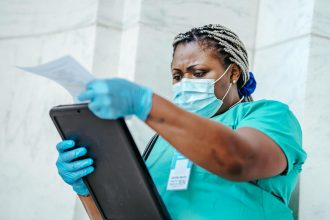personalized-learning-educationPersonalized Learning in Education: Unlock Student Potential Now
The traditional one-size-fits-all approach to schooling is rapidly becoming a relic of the past. Today’s educators are seeking innovative methods to meet the diverse needs of every learner. This is where personalized learning in education steps in, offering a transformative framework that empowers students to take ownership of their academic journey. Are we truly preparing students for a dynamic future by teaching them all the same way?
Imagine a classroom where every student learns at their own pace, focusing on areas where they need support or seeking advanced challenges where they excel. This isn’t a futuristic fantasy; it’s the core promise of personalized learning. It’s about tailoring the educational experience to individual students’ strengths, needs, interests, and learning styles, moving beyond generic lesson plans to create truly impactful educational pathways.
What is Personalized Learning in Education?
At its heart, personalized learning is a student-centered approach designed to give learners agency over their education. It moves away from rigid structures, instead focusing on flexibility and adaptability. This pedagogical model recognizes that each student is unique, possessing different prior knowledge, motivations, and aspirations.
Instead of a uniform curriculum, personalized learning allows for curriculum adaptation. Students often have a voice in what and how they learn, fostering a deeper connection to the material. This approach often integrates various digital tools and resources, making the learning process more dynamic and responsive to individual progress.
Tailoring Content for Individual Needs
One of the foundational pillars of personalized learning is the ability to adapt content. This means providing resources that match a student’s current understanding, whether they need foundational review or advanced enrichment. It’s about ensuring every student is challenged appropriately, preventing both boredom and frustration.
Educators often use diagnostic assessments to identify specific learning gaps or strengths. Based on this data, they can then recommend specific modules, exercises, or projects. This targeted approach ensures that learning is always relevant and impactful for the individual.
The Benefits of Personalized Learning Pathways
Implementing personalized learning in educational settings yields a multitude of advantages, not just for students but for teachers and the entire learning ecosystem. These benefits contribute to a more effective and engaging academic environment.
Here are some key benefits:
- Increased Student Engagement: When learning is relevant and tailored, students are more likely to be motivated and actively participate.
- Improved Academic Performance: Addressing individual needs directly leads to better comprehension and mastery of subjects.
- Enhanced Self-Advocacy: Students learn to understand their own learning styles and advocate for what they need to succeed.
- Development of 21st-Century Skills: Critical thinking, problem-solving, and digital literacy are naturally fostered.
- Greater Equity: Personalized approaches can help close achievement gaps by providing targeted support to struggling learners.
Technology Driving Personalized Learning Solutions
Modern educational technology plays a crucial role in making personalized learning scalable and manageable for educators. Software solutions, often widely used in public and private educational settings for years, provide the infrastructure for creating individualized instruction and adaptive learning experiences.
These tools allow teachers to:
- Track student progress in real-time.
- Assign differentiated tasks and resources.
- Provide immediate feedback.
- Generate data-driven insights into learning patterns.
From adaptive quizzing platforms to comprehensive learning management systems, these technologies are indispensable. They empower teachers to manage complex learning pathways for numerous students simultaneously, transforming classroom innovation.
Data-Driven Insights for Educators
A significant advantage of digital learning platforms is their ability to collect and analyze student data. This data isn’t just about grades; it offers insights into how students learn, where they get stuck, and what motivates them. Teachers can use this information to fine-tune their strategies and provide timely interventions.
Understanding individual student performance through data helps educators make informed decisions. It supports a proactive approach to teaching, allowing for adjustments before issues escalate and ensuring that every student receives the support they need to achieve student success.
Implementing Personalized Learning in Educational Settings
Transitioning to a personalized learning model requires careful planning and a commitment from all stakeholders. It’s a journey that involves shifting pedagogical practices, leveraging appropriate educational technology, and fostering a culture of student-centered learning.
Key steps for successful implementation often include:
- Professional Development: Training educators on new tools and teaching methodologies.
- Pilot Programs: Starting with a small group or subject before a wider rollout.
- Curriculum Alignment: Ensuring personalized pathways still meet learning standards.
- Parental Engagement: Communicating the benefits and process to families.
- Continuous Assessment: Regularly evaluating the effectiveness of personalized strategies.
It’s important to remember that personalized learning is not about replacing teachers with technology. Instead, it’s about empowering teachers with tools and strategies to be more effective facilitators of learning, allowing them to focus on mentoring and guiding students.
Challenges and Solutions in Personalized Learning
While the benefits are clear, implementing personalized learning isn’t without its challenges. Resource constraints, teacher workload, and the initial learning curve for new technologies can be significant hurdles. However, these can be overcome with strategic planning and support.
For instance, collaborative planning time for teachers can help manage workload, while phased technology integration can ease the learning curve. Furthermore, focusing on open educational resources can help mitigate resource constraints. The World Economic Forum highlights the importance of adapting education for future skills, emphasizing the need for flexible learning models.
The Future of Education is Personalized
As we look ahead, the demand for adaptable and relevant education will only grow. Personalized learning in education is not just a trend; it’s a fundamental shift towards a more equitable and effective learning paradigm. By embracing individualized instruction and leveraging the power of technology, we can create learning environments where every student feels seen, valued, and capable of reaching their full potential.
This approach prepares future-ready students, equipping them with the self-direction and critical thinking skills essential for navigating an ever-changing world. It is about fostering lifelong learners who are confident in their abilities and passionate about discovery.
In conclusion, personalized learning pathways offer an incredible opportunity to revolutionize how we educate. By focusing on the individual student, utilizing smart technology, and fostering a supportive environment, educators can unlock unprecedented levels of engagement and academic achievement. It’s a powerful model for transforming classrooms and ensuring every student thrives.
Ready to transform your classroom? Explore our resources on implementing dynamic personalized learning pathways today and empower every student to thrive!
Discover how personalized learning in education is revolutionizing classrooms by tailoring experiences to individual student needs. Explore the strategies, benefits, and technologies like adaptive software that create custom learning pathways, boosting student engagement and academic achievement. Unlock the full potential of every learner with this transformative approach.
personalized learning in education, student success, adaptive software, customized learning, educational technology, student engagement






